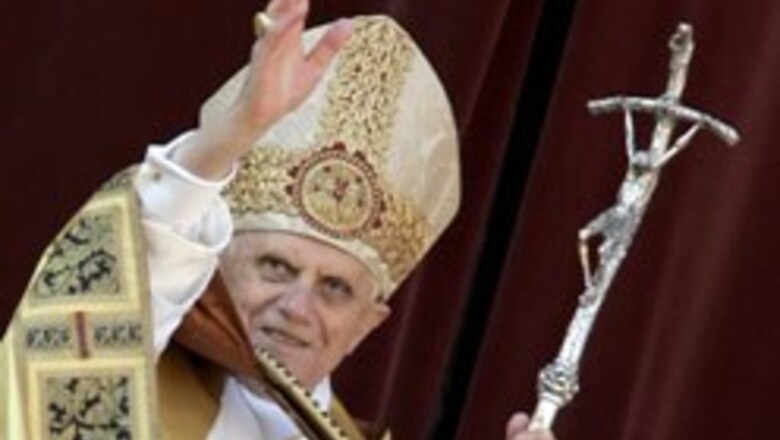
views
Vatican City: Pope Benedict said in his Christmas message on Monday that mankind, which has reached other planets and worships technology, cannot live without God or turn its back on the hungry.
It was shameful that in “this age of plenty and unbridled consumerism” many remained deaf to the “heart-rending cry” of those dying of hunger, thirst, disease, poverty, war and terrorism.
In his “Urbi et Orbi” (to the city and the world) message, he made a heartfelt appeal for peace and justice in the Middle East, an end to the “brutal violence” in Iraq and a solution to fratricidal conflicts in Darfur and other parts of Africa.
“Does a 'Saviour' still have any value and meaning for the men and women of the third millennium?” he asked in his address to tens of thousands of people in a sunny St Peter's Square.
"Is a 'Saviour' still needed by a humanity which has reached the moon and Mars and is prepared to conquer the universe; for a humanity which knows no limits in its pursuit of nature's secrets and which has succeeded even in deciphering the marvellous codes of the human genome?"
“Is a Saviour needed by a humanity which has invented interactive communication, which navigates in the virtual ocean of the Internet and, thanks to the most advanced modern communications technologies, has now made the Earth, our great common home, a global village?”
The Pope, marking the second Christmas season of his pontificate, said that while 21st century man appeared to be a master of his own destiny, “perhaps he needs a saviour all the more” because much of humanity still suffered.
“People continue to die of hunger and thirst, disease and poverty, in this age of plenty and of unbridled consumerism,” he said from the central balcony of Christendom's largest church.
“Some people remain enslaved, exploited and stripped of their dignity; others are victims of racial and religious hatred, hampered by intolerance and discrimination, and by political interference and physical or moral coercion with regard to the free profession of their faith,” he said.
“Others see their own bodies and those of their dear ones, particularly their children, maimed by weaponry, by terrorism and by all sorts of violence, at a time when everyone invokes and acclaims progress, solidarity and peace for all,” he said.
In his address, the Pope also made a reference to the controversial case of Piergiorgio Welby, a paralysed Italian man who was denied a Catholic service because he had asked to die.
“What are we to think of those who choose death in the belief that they are celebrating life?” he said.
Welby, an advocate of euthanasia, died on Wednesday after a doctor gave him sedatives and detached a respirator that had kept the victim of advanced muscular dystrophy alive for years.
In his midnight mass for some 10,000 people in St Peter's Basilica earlier on Monday, he said the image of the baby Jesus in a manger should remind everyone of the plight of poor, abused and neglected children the world over.
At that mass a member of the congregation read a prayer in Arabic asking God to encourage “a spirit of dialogue, mutual understanding and collaboration” among followers of the three great monotheistic religions - Christianity, Judaism and Islam.



















Comments
0 comment